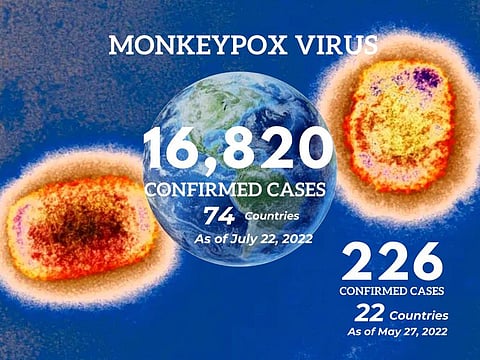How to prevent human-to-human transmission of monkeypox
Monkeypox: Signs, symptoms, preventive measures and vaccines

In less than two months, the global outbreak of monkeypox in “non-endemic” countries has grown from 226 cases in 22 countries (as of May 27) to more than 16,800 cases in 74 countries as of Friday (July 22).
That’s a 74-fold jump in lab-confirmed cases in less than 60 days.
The latest tally, published by the US Centres for Disease Control and Prevention (CDC), shows the potential of the fast-spreading, chickenpox-like virus as a mass-disabling illness, say experts.
Public health emergency
On Saturday, the World Health Organisation (WHO) declared the monkeypox outbreak as a “Public Health Emergency of International Concern” (PHEIC), the UN health body’s highest alert level.
What’s the latest on monkeypox vaccines?
On Monday (July 25), the European Commission (EC) has approved a smallpox vaccine, Imvanex, for use against monkeypox, following a recommendation by the EU's medicines watchdog. Imvanex has been approved in the EU since 2013 for smallpox prevention. It was approved for monkeypox because of the similarity between the monkeypox virus and the smallpox virus.
Bavarian Nordic, the Danish drugmaker that developed the jab, said the approval is valid in all EU member states as well as in Iceland, Liechtenstein, and Norway.
What are the other approved monkeypox vaccines?
In the US, Jynneos vaccine, a two-dose shot against smallpox, has been approved for both smallpox and monkeypox disease in adults 18 years of age and older.
What is Monkeypox?
It is a rare zoonotic (animal origin) disease caused by infection with the monkeypox virus. It occurs primarily in tropical rainforest areas of Africa, where it is "endemic" and is occasionally exported to other regions.
Where did it first emerge?
Monkeypox is a viral illness endemic in West and Central African countries that causes symptoms such as fever and rash. It is similar to but less severe than smallpox, but can be riskier in immune-compromised people.
While it is known to spread mainly via close contact, a study published in the Journal of Virological Methods in 2014 shows evidence that the virus can also be airborne, and stays "viable" for up to 90 hours.
What is the mode of transmission?
It is primarily spread through close contact.
Animal-to-human:
According to the Dubai Health Authority, animal-to-human transmission usually happens through direct contact with the blood, bodily fluids, cutaneous or mucosal lesions of an infected animal or eating insufficiently cooked meat from an infected animal.
Human-to-human:
Though rare, transmission can happen through close contact with respiratory secretions, skin lesions or droplets from an infected person or contaminated objects, as well as through shared items such as bedding or towels.
What is the incubation period?
The interval from infection to onset of symptoms is usually from 6 to 13 days, but can range from 5 to 21 days.
Monkeypox usually clears up after two to four weeks, according to the World Health Organisation.
Monkeypox signs and symptoms?
> Fever > Exhaustion > Lymphadenopathy (swollen lump lymph nodes) > Back and muscle aches > Chills > Intense headache > Skin rash (similar to chicken pox) which usually begins within 1-2 days of fever
How to prevent monkeypox:
Keep your hands clean by washing them for at least 20 seconds with soap and water or alcohol-based hand sanitiser.
How to prevent animal-to-human transmission:
> Avoid contact with wild animals (alive or dead)
> Cook meat properly
> Avoid contact with any objects that have been in contact with a sick animal.
How to prevent human-to-human transmission:
> Avoid contact with any person that has a rash.
> Avoid contact with any object that has been in contact with a sick person.
Treatment
> It is a usually self-limited disease with the symptoms lasting from 2 to 4 weeks.
> Symptomatic supportive care is to be considered.
What the WHO said:
On Saturday (July 23), the WHO declared the monkeypox outbreak a public health emergency of international concern (PHEIC), thus paving the way for stepped-up global surveillance and cooperation to stop the virus’ spread.
"With the tools we have right now, we can stop monkeypox transmission and bring this outbreak under control. It’s essential that all countries work closely with affected communities to adopt measures that protect their health, human rights and dignity," said Tedros Adhanom Gebreyesus.
MONKEYPOX: PUBLIC HEALTH EMERGENCY
⚪ The World Health Organisation declared on Saturday (July 23, 2022) the monkeypox outbreak as a “Public Health Emergency of International Concern” (PHEIC), the UN health body’s highest alert level. ⚪ As of Friday (July 22), more than 16,800 people had been infected with monkeypox in 74 countries, according to a tally by the US Centers for Disease Control and Prevention (CDC). ⚪ The World Health Network (WHN), an independent group of renowned scientists, has earlier declared monkeypox a “pandemic”.
[With inputs from Reuters, DHA]







